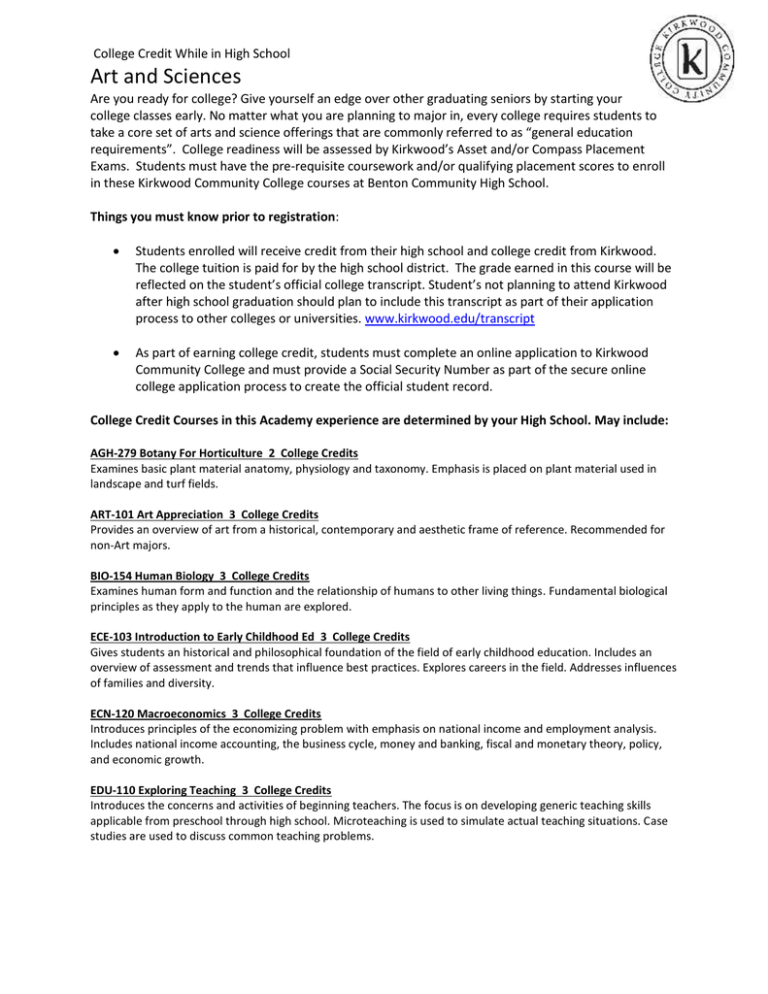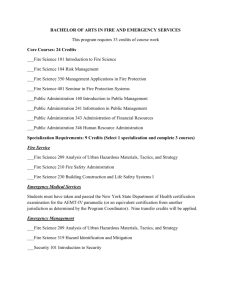Arts & Sciences/On-site - Kirkwood Community College
advertisement

College Credit While in High School Art and Sciences Are you ready for college? Give yourself an edge over other graduating seniors by starting your college classes early. No matter what you are planning to major in, every college requires students to take a core set of arts and science offerings that are commonly referred to as “general education requirements”. College readiness will be assessed by Kirkwood’s Asset and/or Compass Placement Exams. Students must have the pre-requisite coursework and/or qualifying placement scores to enroll in these Kirkwood Community College courses at Benton Community High School. Things you must know prior to registration: Students enrolled will receive credit from their high school and college credit from Kirkwood. The college tuition is paid for by the high school district. The grade earned in this course will be reflected on the student’s official college transcript. Student’s not planning to attend Kirkwood after high school graduation should plan to include this transcript as part of their application process to other colleges or universities. www.kirkwood.edu/transcript As part of earning college credit, students must complete an online application to Kirkwood Community College and must provide a Social Security Number as part of the secure online college application process to create the official student record. College Credit Courses in this Academy experience are determined by your High School. May include: AGH-279 Botany For Horticulture 2 College Credits Examines basic plant material anatomy, physiology and taxonomy. Emphasis is placed on plant material used in landscape and turf fields. ART-101 Art Appreciation 3 College Credits Provides an overview of art from a historical, contemporary and aesthetic frame of reference. Recommended for non-Art majors. BIO-154 Human Biology 3 College Credits Examines human form and function and the relationship of humans to other living things. Fundamental biological principles as they apply to the human are explored. ECE-103 Introduction to Early Childhood Ed 3 College Credits Gives students an historical and philosophical foundation of the field of early childhood education. Includes an overview of assessment and trends that influence best practices. Explores careers in the field. Addresses influences of families and diversity. ECN-120 Macroeconomics 3 College Credits Introduces principles of the economizing problem with emphasis on national income and employment analysis. Includes national income accounting, the business cycle, money and banking, fiscal and monetary theory, policy, and economic growth. EDU-110 Exploring Teaching 3 College Credits Introduces the concerns and activities of beginning teachers. The focus is on developing generic teaching skills applicable from preschool through high school. Microteaching is used to simulate actual teaching situations. Case studies are used to discuss common teaching problems. College Credit While in High School Art and Sciences ENG‐105 Composition I 3 College Credits Develops expository writing with emphasis on organization, supporting details, style, vocabulary, and library research skills. ENG‐106 Composition II 3 College Credits Teaches precise and responsible use of research tools. Requires critical analysis of reading materials, audience and self when communicating content material. Develops students’ ability to use effective and ethical arguments. FLS-142 Elementary Spanish II 4 College Credits Allows the student to communicate with others on subjects of daily common experience in most informal and a limited number of formal conversations on activities related to family, work, health, friends, leisure activities, social life, environment, etc. The vocabulary used in this course is non-specialized, containing everyday words as well as frequently used expressions, all within a cultural context. Cultural facts from Hispanic and Latin American cultures will also be presented in the classroom. FLS-241 Intermediate Spanish I 4 College Credits Develops fundamental skills in Spanish through activities aimed at expressing original ideas and conveying messages in correct Spanish with the aid of authentic resources. Class activities offer advanced training in listening, speaking, reading, writing, and understanding the cultures of Spanish-speaking countries. Grammar study includes a review of previously introduced topics as well as new ones. FLS-242 Intermediate Spanish II 4 College Credits Enables students to continue to develop all communications skills, using primarily materials from literature, contemporary newspapers and magazines aimed at providing a better understanding of the Hispanic and Latin cultures and pertinent current issues. Class activities include pronunciation exercises, some grammar review and class discussion that promotes spontaneous conversation. HIS-123 Europe in the Age of Revolution 3 College Credits Studies four revolutions - the Scientific, French, Industrial and 19th Century Liberal revolutions - that changed the traditional Western society into the modern world. HIS-151 U.S. History to 1877 3 College Credits Studies the European background, the colonial experience, the revolutionary period and 19th century history to the Civil War. Includes political, economic and social history of this period as well as the development of American thought. HIS-152 U.S. History Since 1877 3 College Credits Studies the period from reconstruction to the present. Emphasis is upon industrialization and its impact; the development of a strong federal government; an aggressive foreign policy; and a growing involvement in an international economy. HUM-116 Encounters in Humanities 3 College Credits By asking a series of questions about various examples of human activity (literature, philosophy, history, visual arts and music), teaches a method of inquiry for use in understanding and appreciating the humanities. LIT-206 Forms of Lit Fiction 3 College Credits Explores, through short stories, novels, films and critical theory, the following questions: What is fiction? What are its common elements? How does understanding these elements and the ways they interconnect affect our understanding of how fiction is crafted, read and interpreted? How is fiction different from or similar to other forms of literary expression? College Credit While in High School Art and Sciences MAT-107 Survey of Math 4 College Credits Provides an overview of topics that include: sets, real number systems, ratios, proportions, percentages, geometry, algebra and functions. The course is for students with a minimum of one year of high school algebra and who intend to take Statistical Ideas or Mathematics and Society. MAT-115 Math & Society 3 College Credits Introduces selected areas of mathematics in familiar settings and develops students' conceptual and problemsolving skills. The course includes a study of mathematical concepts selected from statistics, probability, game theory, growth patterns and coding information. Other topics may be included. MAT-140 Finite Math 3 College Credits Includes methods of solving linear equations and inequalities. Introduces linear programming, matrices, functions, graphs, counting techniques, probability, mathematics of finance and applications. MAT-210 Calculus I 4 College Credits Includes limits, derivative, differentiation, the differential elementary applications of calculus and introduction to integration. MUS-100 Music Appreciation 3 College Credits Includes study of elements and forms of music with attention to major historical periods and composers of historical significance and survey of indigenous music. MUS-102 Music Fundamentals 3 College Credits Introduces music majors and non majors to the principal elements of music theory including notation, melody, choral harmony and musical form. Intended for students with strong interest but limited background in music theory. SDV-102 How College Works 1 College Credits Explores students’ individual strengths, and life and vocational goals, as they identify a college program or major. Emphasizes using self-assessments to identify appropriate career areas, understanding the differences between high school and college expectations, taking and using placement tests for college admission, and managing personal finances to afford a college education. SDV-160 Career Decision Making 2 College Credits Provides an understanding of the career development process, and assists students in making satisfactory career choices. Includes self-assessment, career information research, decision making and job search strategies. SPC‐101 Fundamentals or Oral Communication 3 College Credits Studies basic communication theory and practice including communication process, interpersonal relationships, small group interaction and public speaking. PSY‐111 Introduction to Psychology 3 College Credits Introduces the scientific study of mental processes and behavior with emphasis on the nervous system, learning and memory, cognition, sensation, and perception, motivation and emotion, personality, intelligence, stress, psychological disorders and therapy, and social influence. Stresses roles of both theory and empirical evidence in describing, explaining and predicting behavior. Encourages critical thinking about research methods and ethics. SOC-110 Introduction to Sociology 3 College Credits Surveys the basic principles, concepts, research strategies and empirical findings representative of the field today. The course examines the range of sociological thought, identifies areas of specialization within the discipline and establishes a basis for further study in the field.






